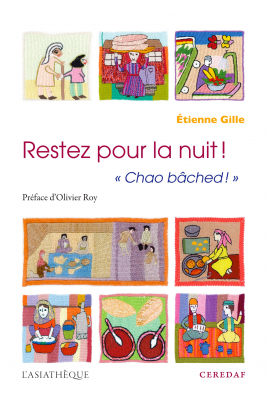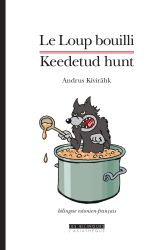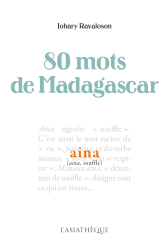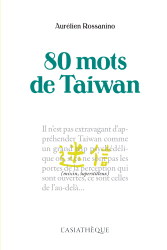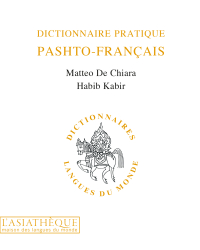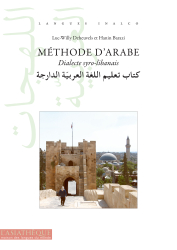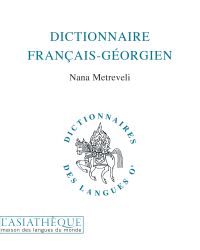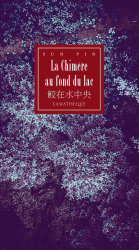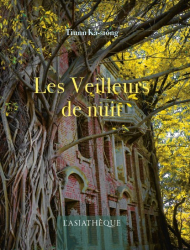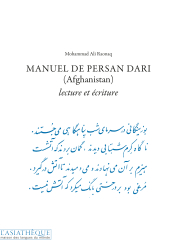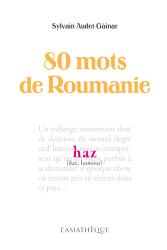Details
Format: Paperback
ISBN: 9782360570805
Collection: Hors Collection
16 x 24 cm
Weight: 382 gr
Pages: 176
First publication: 07/12/2016
Last printing: 11-2019
CLIL: 4093
BISAC: SOC008070
This book is for those who want to learn more about the history, culture and way of life of Afghans as they come to meet or welcome them.
The former president of the association Franco-Afghan Friendship illustrates the tradition of hospitality among Afghans. He describes the Afghan lifestyle specificities and offer the foreign host better clarification on what to do and not to do and to accompany him step by step through his meeting with families, the administrations, urban and rural people. He also targets people who are interested to learn more about Afghan history, culture and lifestyle. Throughout his presentation of Afghan customs, he tries to grasp the main characteristics of what can be named as the Afghan soul.
CONTRIBUTORS' BIOGRAPHIES
Etienne Gille

Etienne Gille was a mathematics teacher at Esteqlal high school, the Franco-Afghan high school from Kabul. He is one of the founders of the AFRANE Association (Amitié Franco-Afghan) of which he was until very recently the president. He performed numerous missions in Afghanistan and is director of publication and editor chief of the journal Les Nouvelles d'Afghanistan.
Olivier Roy

Olivier Roy (born in 1949) is a French political scientist specializing in Islam. After learning Persian at Inalco, he became an associate of philosophy in 1972, but his teaching career was interrupted by numerous trips to Afghanistan. He also participated in fighting alongside the resistance during the Afghan war against the USSR in the 1980s. He then moved to Central Asia to study Uzbekistan and Tajikistan. He became a doctor of the Institut d'études politiques de Paris in political science in 1996, and was promoted to director of research at the CNRS and director of studies at EHESS in the Turkish Domain team. He is also an associate researcher at the International Research Center (CERI). Since September 2009, he has been a professor at the European University Institute in Florence (Italy), where he directs the Mediterranean Program.
TABLE OF CONTENTS
Préface d’Olivier Roy (Preface by Olivier Roy)
À la recherche de l’afghanité (In search of Afghanness)
Langues et ethnies (Languages and ethnicities)
Les salutations (Greetings)
Comment s’appeler (What to call)
Les noms de personnes (The names of people)
Le tutoiement (Use of the Tu form)
Comment entrer chez les gens (How to enter people's homes)
Les préséances (Precedence)
Les marques de respect (Marks of respect)
Les marques d’amitié (Marks of friendship)
Le comportement des hommes à l’égard des femmes (The behavior of men towards women)
Le regard (The look)
Les compliments (Compliments)
De quelques expressions (Of some expressions)
Les adieux (Goodbyes)
Dans une lettre (In a letter)
L’hospitalité (Hospitality)
L’accueil (Home)
Chao bâched ! (Chao bached!)
La nuit (The night)
La maison (The House)
Le sandali (The sandal)
Les cadeaux (Gifts)
L’insistance (Insistence)
Les remerciements (Thanks)
La serviabilité (Helpfulness)
Le regard sur l’étranger (The look abroad)
La bienséance dans les attitudes (Decorum in attitudes)
Comment s’asseoir (How to sit)
Parler avec discrétion (Speak with discretion)
Gestuelle (gesture)
Humeurs et besoins naturels (Natural moods and needs)
La main droite (The right hand)
La nourriture (The food)
Nân o namak (Nan o namak)
Le rite du repas (The ritual of the meal)
La cuisine (The kitchen)
Les épices (The spices)
Les fruits et les légumes (Fruits and vegetables)
Les boissons (The drinks)
Le petit déjeuner (Breakfast)
Le tabac, les stupéfiants (Tabacco, narcotics)
L’apparence (The appearance)
Soigner son image (Take care of your image)
Photographier (Photograph)
Le vêtement (Clothing)
La tenue vestimentaire des femmes (Women's clothing)
Le voile (The veil)
Le système pileux (The hair system)
La couleur de la peau (Skin colour)
La propreté (Cleanliness)
Les traits distinctifs de l’afghanité (Distinctive features of Afghanness)
Un oui qui n’est pas toujours un oui (A yes that is not always a yes)
L’humour (Humour)
Le rire (The laugh)
La violence (Violence)
La modestie et la vanité (modesty and vanity)
Le sans-gêne et la discrétion (Without embarrassment and discretion)
L’honneur (honour)
Le fatalisme et la relation au temps (Fatalism and the relationship to time)
L’ingéniosité (Ingenuity)
La solidarité (Solidarity)
La religion et les valeurs (religion and values)
La religiosité (Religiosity)
La tolérance (Tolerance)
Les pratiques religieuses (Religious practices)
Les superstitions (Superstitions)
La médecine traditionnelle (Traditional medicine)
Le sens poétique et mystique (The poetic and mystical sense)
Le pachtounwali et la charia (The Pashtunwali and the Sharia)
Les valeurs et leurs limites (Values and their limits)
La famille (Family)
Son importance (His importance)
L’éducation des enfants (Children's education)
Les relations hommes-femmes (Male-female relationships)
La polygamie (Polygamy)
De quelques pratiques sociales et culturelles (Some social and cultural practices)
La liberté d’expression (Freedom of speech)
Le marchandage (haggling)
Le prix d’un taxi (The price of a taxi)
Le piston (The piston)
La corruption (Corruption)
Les jeux (Games)
Les arts (Arts)
De quelques fêtes (some parties)
Le calendrier (The calendar)
Naorouz (Naoruz)
Les autres fêtes (The other festivals)
La naissance et la circoncision (Birth and Circumcision)
Le mariage (The wedding)
Les funérailles (Funerals)
Des durs au coeur tendre (Tough people with soft hearts)
Annexes (Appendices)
Histoires afghanes (Afghan stories)
Proverbes (Proverbs)
Quelques emprunts du français au persan (Some Borrowings from French to Persian)
Poids et mesures (Weights and measures)
Chronologie (Chronology)
Bibliographie (Bibliography)
